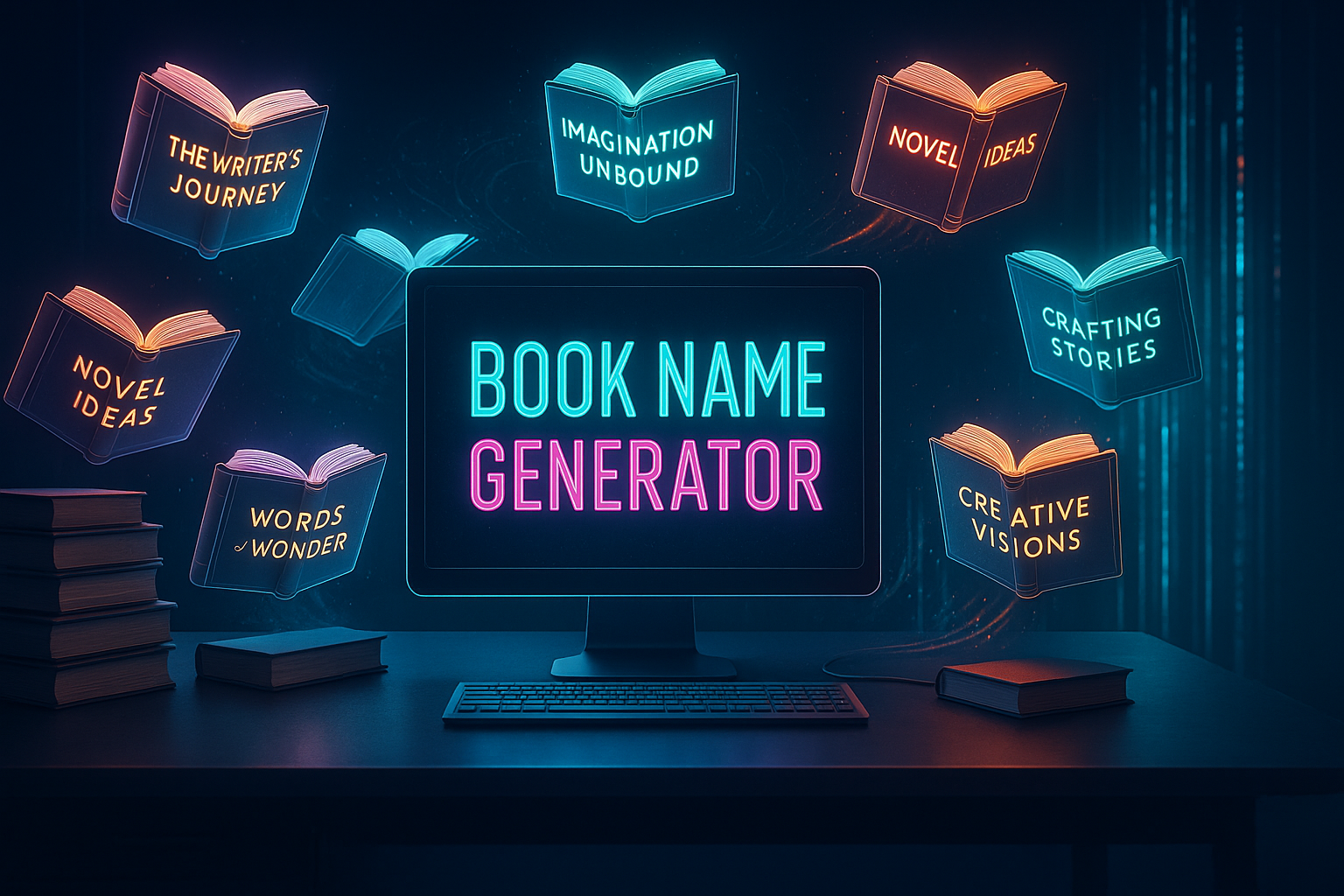Choosing the right book name is one of the most critical steps for authors and publishers—it impacts visibility, branding, and sales. A book name generator can help you brainstorm creative, market-ready titles in seconds. In this guide, you’ll learn how to use a book title generator effectively, how successful authors test names, and even how to create a book club name generator for community engagement. Plus, we’ll explore practical examples, step-by-step instructions, and expert tips to make sure your book name connects with both readers and algorithms.
Why Your Book Name Matters (and Why Generators Help)
Research shows that 70% of readers decide whether to click or buy a book based on its title alone (Source: BookBaby 2024 Author Survey). A strong title does three things:
- Captures attention in crowded marketplaces like Amazon or Goodreads
- Communicates genre & promise to readers (thriller, romance, nonfiction, etc.)
- Optimizes for discoverability in search engines and book platforms
👉 This is why book name generators have exploded in popularity—they give authors and publishers a fast way to spark creativity, test options, and ensure titles are SEO-friendly.
What is a Book Name Generator?
A book name generator is a digital tool that uses algorithms, keyword databases, and sometimes AI to produce creative, genre-specific book titles.
Types of Generators:
- Book Title Name Generator → Creates catchy, market-ready book titles
- Book Club Name Generator → Helps groups craft unique, memorable community names
- AI-Powered Generators → Use large language models to mix creativity with keyword targeting
How to Use a Book Title Generator Effectively
Many writers make the mistake of just picking the first cool name they see. Instead, follow this 4-step framework to maximize results:
1. Define Your Genre & Audience
- Thriller = suspense, danger, mystery words
- Romance = emotions, relationships, warmth
- Business/Nonfiction = clarity, authority, value
📌 Example: For a local Pakistani entrepreneur writing a startup guide, a generator might suggest:
- “Startup Sparks”
- “Scaling in Karachi”
- “Blueprints of Growth”
Notice how local keywords (USA, UK, CANADA) can make a title stand out in regional markets.
📊 Powerful Comparison Table
Here’s a table you can embed in the article (Google loves structured content like this).
Book Name Generator Comparison
| Feature / Tool | AI-Powered Generator | Simple Random Generator | Book Club Name Generator | Manual Brainstorming |
|---|---|---|---|---|
| Creativity Level | Very High (context-aware) | Medium (random words) | Medium-High (niche focused) | Depends on skill |
| SEO Optimization | ✅ Built-in keyword suggestions | ❌ None | ✅ Can include local keywords | ✅ If researched |
| Best Use Case | Authors & Publishers | Quick inspiration | Community groups | Experienced writers |
| Cost | Free–Paid versions | Free | Free | Free |
| Time Required | Seconds | Seconds | Seconds | Hours |
| Scalability | Excellent for series/books | Low | Medium | Low |
| Risk of Generic Titles | Low | High | Medium | Medium |
2. Feed Keywords into the Generator
Instead of using random prompts, add seed keywords:
- Main topic (e.g., “AI,” “Love,” “Startup”)
- Tone (e.g., “dark,” “funny,” “practical”)
- Location if relevant
📌 Mini-Case Study:
A Lahore-based fiction writer entered: “magic, betrayal, empire” into a generator. The best options included:
- Empire of Forgotten Flames
- The Betrayer’s Magic
- Ashes of the Eastern Dawn
The author later tested these with readers, and one became the final title.
3. Shortlist & Test With Readers
Use surveys, social polls, or A/B testing tools. Ask:
- Which title would you click on?
- Which feels most original?
- Which matches the story/genre?
4. Optimize for SEO & Discoverability
- Add descriptive words (“guide,” “secrets,” “manual,” “story”)
- Check Amazon/Goodreads to avoid duplicates
- Ensure it’s easy to spell & remember
📌 Example:
Instead of “Infinite Blue”, use “Infinite Blue: A Sci-Fi Story of Love and Loss”.
Beyond Books: Why You Need a Book Club Name Generator
A book club name generator is perfect for communities, libraries, and schools. It creates catchy, inclusive names that make groups memorable.
Examples:
- “Readers of Rawalpindi”
- “Karachi Page Turners”
- “Islamabad Lit Collective”
Local context = stronger community identity + better local search visibility.
Pro Tips from Publishing Experts
✅ Keep it under 5 words for memorability
✅ Avoid clichés like “Secrets of…” unless backed by unique content
✅ Think long-term—the title should grow with your brand
✅ Check trademarks & domains if you want to expand into a series, website, or podcast
Frequently Asked Questions (FAQ)
Q1: Are book name generators free?
Most online tools are free. Premium ones may offer genre-specific AI suggestions.
Q2: Can I use a generator name without editing?
Yes, but best practice is to refine it. Combine generator output with your creativity.
Q3: Do book titles affect SEO?
Yes. Titles with keywords rank higher in Amazon and Google searches, boosting discoverability.
Schema Markup (Recommended)
- Article Schema → For this blog post
- FAQ Schema → For the section above
- LocalBusiness Schema → If promoting a regional publisher, writing service, or book club
Final Thoughts
A book name generator is not just a creativity shortcut—it’s a strategic tool for branding, SEO, and reader engagement. By combining generator outputs with local keywords, genre insights, and testing, you can craft a title that:
- Attracts attention
- Builds authority
- Increases visibility in both Google and book marketplaces
If you’re an author, publisher, or even a book club founder, start experimenting with these tools today. The right name could be the difference between being overlooked—or becoming unforgettable.








